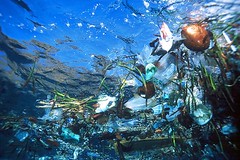 Image by cesarharada.com via FlickrBy Lou Kawakami
Image by cesarharada.com via FlickrBy Lou KawakamiRecently, we saw the Plastiki - a sailboat made out of 12,500 plastic bottles - complete its 15,000 km journey from San Francisco to Sydney. The publicity surrounding this event has been used to highlight the perils facing the oceans and one of them is plastic waste.
A big mess in the oceans
According to the United Nations Environment Programme (UNEP), over 13,000 pieces of plastic litter the surface of each square kilometre of ocean. Charles Moore, the scientist credited for discovering the Pacific Garbage Patch said earlier this year: "Humanity's plastic footprint is probably more dangerous than its carbon footprint." We've heard of the Pacific Garbage Patch, now scientists are warning that a floating mass of scattered refuse extends over thousands of square miles in the remote Atlantic.
Marine life - the victims of our plastic pollution
The NOAA estimates 100,000 turtles and marine mammals are killed by garbage every year. Turtles are particularly vulnerable as they cannot distinguish between jellyfish (their staple feed) and plastic. Plastic pollution is also a hazard to human safety. Waste can clog up waterways and this can have catastrophic consequences. Plastics were identified as a major contributor to severe flooding in Bangladesh in the late 1990s and in the aftermath, a total ban was imposed on plastic bags.
An expensive mess
Plastic waste is expensive. Plastic products may be cheap to produce - just pennies for a typical shopping bag - but their cleanup (not to mention their effects on human and environmental health) can cost a lot more.
Is biodegradable plastic the solution?
It's worth bearing in mind how plastics are made. They are petroleum products made from a non-renewable source and dependency on oil is continued with plastic use. Plastics do not break down easily. The time required for a typical plastic bag to decompose is believed to range from 20 to 1,000 years. Biodegradable plastics have been around for over twenty years. These are made using products such as corn, hemp and soy. While this is not a solution to the plastic waste problem (because biodegradable plastics can also have an environmental impact), it is a serious consideration within the wider scheme of waste management.
Reduce, reuse, recycle
The fact of the matter is, if you use it, it has to end up somewhere. Only by following the three Rs motto, can the plastic problem be dealt with.
Using less plastic
The simple solution is to not create the waste in the first place. Is that bottle of soda or water really necessary? Less than 20 per cent of plastic water bottles are recycled. We also have to ask ourselves if we really need those extra household items that won't be in use for long and will create more waste.
Recycling is everyone's responsibility
It is estimated that between 3 and 6 per cent of plastics are recycled around the world. There is need for improvement. The mindset has to change from "disposable" to RECYCLABLE. Companies who have taken initiatives to make their products more recyclable are seeing rewards. At the government level, those municipalities and local governments that have incorporated recycling into their waste management schemes are dealing with significantly less waste going to the landfills. Consumers have to play their part by making a greater effort to recycle. Too many recyclable items are still going to the landfills.
Dispose properly
We shouldn't forget this important aspect. Carelessly tossed waste is more likely to end up in the waterways than if it was placed in a disposal unit. 80 per cent of ocean plastics come from land.
If you found this useful, please see Sea Forever, a website dedicated to oceans and green living at http://www.sustainablewaters.com
Lou Kawakami is a blogger and a consultant with a keen interest in the oceans and environmentally-friendly living. She has an extensive background in marketing, education and social policy. In addition, she is a scuba diving instructor who has travelled a bit.
Article Source: http://EzineArticles.com/?expert=Lou_Kawakami
http://EzineArticles.com/?Plastic-Pollution---A-Ticking-Time-Bomb-For-the-Ocean&id=4880362

No comments:
Post a Comment